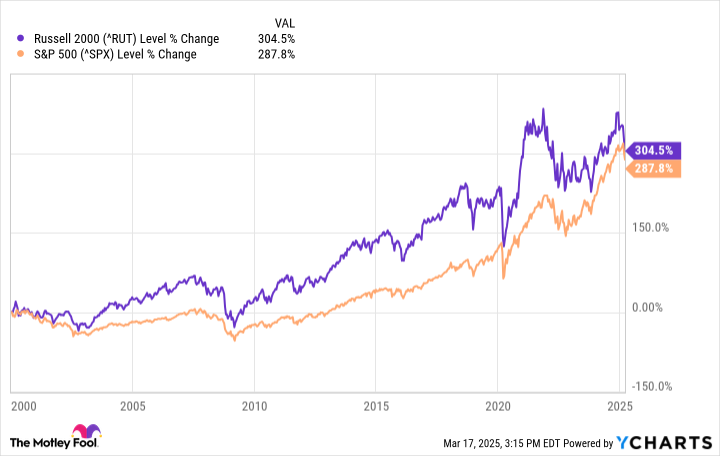Some of the best stocks to buy in the past 25 years started as small-cap stocks. Amazon (AMZN -2.58%) was a $7 stock in 1998, and Tesla (TSLA -5.06%) had a market valuation of just over $1 billion in 2010.
Of course, not every small-cap company becomes a giant. Investing in small companies can be rewarding, but it also comes with risks that investors need to understand. Here's a close look at small-cap stocks, including our picks for some of the best.

What are small-caps?
What are small-cap stocks?
Small-cap is short for small market capitalization, which is equal to a company's share price times the number of shares outstanding. A company is classified as having a small market capitalization when its market cap falls between roughly $300 million and $2 billion.
Stocks classified by market capitalization are generally divided as follows:
| Category | Market Capitalization |
|---|---|
| Micro-cap companies | Less than $300 million |
| Small-cap companies | $300 million to $2 billion |
| Mid-cap companies | $2 billion to $10 billion |
| Large-cap companies | $10 billion to $200 billion |
| Mega-cap companies | More than $200 billion |
Small-cap companies are often young companies. They tend to have significant growth potential, but they also are generally less stable than their larger, more established peers. Often, they are unprofitable.
However, a comparison since 2000 of the Russell 2000, a small-cap-focused index, and the large-cap-focused S&P 500 shows that small-cap stocks have outperformed large-cap companies. The chart below demonstrates the difference:

Over time, small-cap stock prices tend to be more volatile than those of larger companies, and stock values fluctuate more dramatically.
Typically, small caps outperform in bull markets, but the recent one has been different. Thanks to the AI boom, large-cap tech stocks have paced the stock market's gains, and small-cap stocks have underperformed, in part due to high interest rates. Small caps have also fallen sharply amid concerns about tariffs and trade wars, showing again that they're more volatile than their large-cap peers.
However, when investor confidence in the economy returns, expect small caps to recover faster than large caps.
Best small-cap stocks
Best small-cap stocks to buy right now
Many small-cap companies aren't household names -- at least, not yet. These are some small-cap stocks to consider:
1. Magnite
Magnite (MGNI -2.52%) is a supply-side digital advertising platform that was formed by several mergers and acquisitions. The company has established itself as a leader in video and connected TV (CTV) advertising, or ad-driven streaming, catering to online publishers and streaming platforms like Walt Disney (DIS -2.52%), Fox (FOX -3.45%), and Warner Bros. Discovery (WBD -3.58%).
Magnite partners with The Trade Desk (TTD -1.6%) and other ad tech companies to manage publisher inventory efficiently and keep its technology up to date. While its growth has slowed due to the weakness in the streaming sector, Magnite still has a lot of potential growth ahead of it and remains the CTV leader for supply-side ad tech.
2. Amplitude
Amplitude (AMPL -2.47%) is a leader in digital product analytics. The company's software allows companies to see how customers interact with their apps and websites so they can make improvements and learn what works and what doesn't.
For example, Amplitude helped guide Burger King's "Whopper Detour" campaign. It also showed Peloton (PTON -1.92%) how social engagement was key to getting its customers to stick with its workouts.
Like a lot of software stocks, Amplitude struggled in the aftermath of the pandemic as many of its customers restructured their contracts. But the company has moved past that churn. It's seeing improving growth, especially in remaining performance obligations, a proxy for backlog.
Amplitude is also planning to launch an AI agent later in 2025, which could help accelerate its growth. The company has built out its product suite and looks poised to grab market share from Google Analytics and Adobe Analytics, the category leaders. If Amplitude can fulfill its promise, the stock could move a lot higher from here.
3. Consolidated Water
Utilities come in all shapes and sizes, so it shouldn't be surprising to find a water utility on this list.
Consolidated Water (CWCO -0.83%) specializes in desalination, which could become a big trend in coming years as water supplies around the world are stretched and more coastal and tropical communities turn to desalination.
The company is currently focused on the Caribbean market, with several plants in the Cayman Islands and the Bahamas. That's helped it deliver strong growth in recent years, outperforming its water utility peers. The trend should continue as it capitalizes on the desalination opportunity and water scarcity becomes a greater problem.
ETFs & mutual funds
Best small-cap funds
If you don't want to choose individual small-cap stocks for your portfolio, you can instead gain exposure to small-cap companies by investing in a small-cap-focused exchange-traded fund (ETF) or mutual fund. Here are a couple of options:
- iShares Russell 2000 ETF (IWM -0.87%): This ETF tracks the performance of the Russell 2000, which is considered the leading index of small-cap stocks. The fund's managers charge an annual management fee of 0.19%, which works out to $1.90 for every $1,000 invested.
- Fidelity Small Cap Growth Fund (NASDAQMUTFUND:FCPG.X): This mutual fund invests in small-cap stocks that have high growth potential. It's actively managed, with the objective of outperforming the Russell 2000, so the fund's fees -- 0.94% annually -- are somewhat high compared to most ETFs.
Looking forward
Small-cap stocks in 2025
In the bull market that began in early 2023, small-cap stocks have largely underperformed, with the bulk of the gains going to "Magnificent Seven" stocks like Nvidia (NVDA -7.03%).
However, investors expect the bull market to eventually broaden out, with small caps catching up to large caps. We saw a hint of this in July 2024 before broader economic concerns pushed stocks lower again, and again in the post-election rally that faded. Small-cap stocks should also benefit from falling interest rates, which have begun to come down. After the pullback, the Russell 2000 still trades at a significantly lower price-to-earnings ratio than the S&P 500, which could eventually drive small caps' outperformance as investors look to capitalize on their value.
Related investing topics
Should you invest?
Should you invest in small-cap stocks?
If you are willing to hold an investment for several years and feel comfortable with the price of a stock fluctuating greatly, then small-cap stocks might have a place in your portfolio. Owning small-cap stocks can boost your portfolio's overall growth rate -- provided you commit to a buy-and-hold investing strategy.
Remember, small companies are more likely to fail than large, established businesses, as we saw during the COVID-19 pandemic. It's important to conduct the necessary research before investing in any small-cap stock. You can also lower your risk by investing in a small-cap-focused fund.












